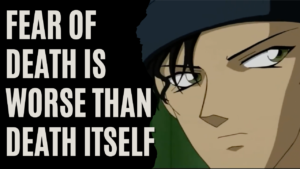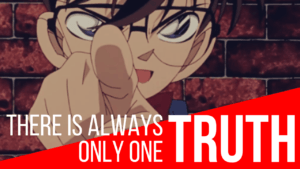Let’s learn Japanese with Nobita’s quote from Doraemon.
CONTENTS
Video
Nobita’s Quote
Japanese: 一番いけないのは自分なんかダメだって思い込むことだよ。
Romaji: ichiban ikenai no wa jibun nanka dame da tte omoikomu koto da yo.
English: Thinking you’re worthless is the worst thing you can do.
Analysis
The sentence structure is AはBだ meaning “A is B”.
A: 一番いけないの
一番 means “number one“ or “the most“.
いけない means “bad” which is a softer way to say 悪い.
The の particle is used to change the preceding word into a noun.
So 一番いけないの means “the worst thing”.
B: 自分なんかダメだって思い込むこと
自分 means “I” or “me” which is more objective than the first person pronouns like 私.
なんか is used to make the preceding word seem unimportant. So 自分なんか is like “someone like me“ in a humble way.
ダメ means “hopeless” or “worthless”.
だ is the auxiliary verb which makes the statement declarative. It’s used with a noun or na-adjective.
って is the casual form of the quotation particle と which works as quotation marks or the conjunction “that” used with a verb like “say” or ”think” and 思い込む means “to think” with certainty of one’s beliefs, so 自分なんかダメだって思い込む means “to think that I’m worthless“.
こと is also used to change the preceding word into a noun just like the particle の, so 自分なんかダメだって思い込むこと means “thinking that I’m worthless”.
こと and の are interchangeable in many cases but when you use it with だ or です, you can only use こと. So the こと in the B part cannot be replaced with の whereas the の in the A part ( 一番いけないの) can be replaced with こと but you tend not to repeat the same words in a sentence so の is better as こと is used later in the predicate.
Lastly, よ is the sentence ending particle which is used when the speaker is trying to tell something the listener should know.
Examples
Noun + なんか (makes the preceding word seem unimportant)
私なんか、まだまだです。
watashi nanka, madamada desu.
Someone like me still has a long way to go.
ひらがななんか、簡単だよ。
hiragana nanka, kantan da yo.
Hiragana is easy.
あいつの言うことなんか、信じるな。
aitsu no iu koto nanka, shinjiru na.
Do not believe what that guy says.
In this usage, なんか and なんて are interchangeable but when it’s followed by a particle, you can only use なんか.
お前なんか (
なんて) に構ってる暇はない。omae nanka ni kamatteru hima wa nai.
I don’t have time to care about you.
ダメ (hopeless, worthless)
このテレビはダメだ。壊れてる。
kono terebi wa dame da. kowareteru.
This TV set is useless. It’s broken.
このチームはダメだ!全員やる気がない。
kono chīmu wa dame da! zen’in yaruki ga nai.
This team is hopeless! None of the members are motivated.
またお酒を飲みすぎて道端で寝てしまった。私はダメ人間だ!
mata osake o nomisugite michibata de nete shimatta. watashi wa dame ningen da!
I drank too much alcohol and slept on the roadside again. I am a worthless human!
- ダメ also means “no good” which can be substituted with いけない, but ダメ sounds more subjective and has a strong nuance of “NO”.
タバコを吸っちゃダメだよ/いけないよ。
tabako o succha dame da yo/ikenai yo.
It’s no good to smoke.
- It can be written in kanji as “駄目”, but “ダメ” in katakana is more commonly used.
Clause + の/こと (nominaliser)
大事なのは何事も楽しむことだよ。
daiji na no wa nanigoto mo tanoshimu koto da yo.
The important thing is to enjoy yourself in everything you do.
私が一番苦手なのは漢字を書くことです。
watashi ga ichiban nigate na no wa kanji o kaku koto desu.
What I most dislike is writing kanji.
人生で一番悲しかったのは、母を亡くしたことです。
jinsei de ichiban kanashikatta no wa, haha o nakushita koto desu.
Losing my mother was the saddest thing in my life.
You can swap the topic and the predicate depending on what you want to put emphasis on:
- 一番いけないのは自分なんかダメだって思い込むことだよ – THINKING YOU’RE WORTHLESS is the worst thing you can do
- 自分なんかダメだって思い込むのは一番いけないことだよ – Thinking you’re worthless is THE WORST THING YOU CAN DO
Support Easy Peasy Japanesey
If you enjoy our content, please consider supporting Easy Peasy Japanesey. Your support will help keep us going. Thank you for your support!


